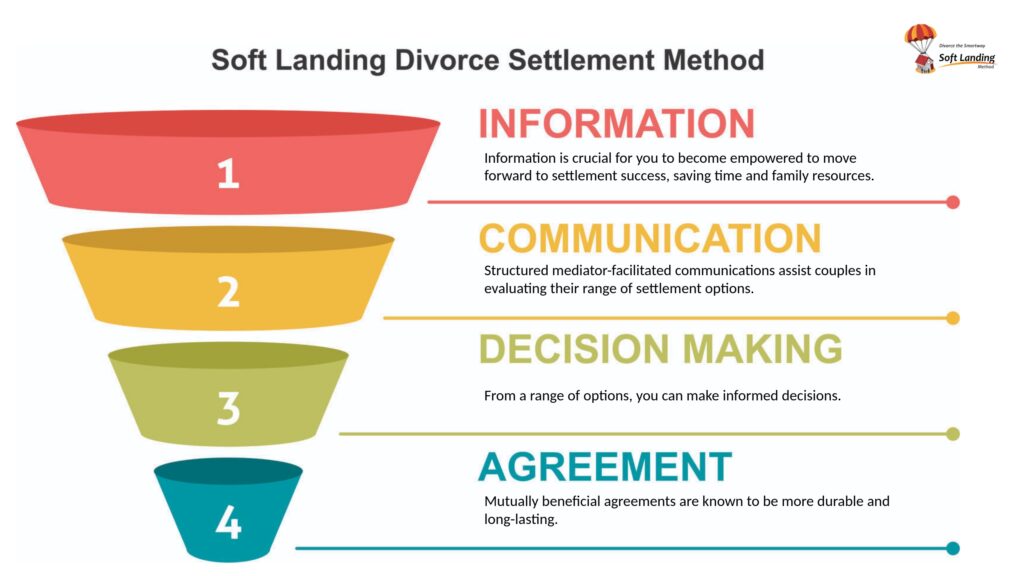Ultimate Roadmap to Separation Agreement (Ontario)
Understanding the process of crafting a separation agreement in Ontario can be a game-changer for couples in the midst of a legal separation. In Ontario, a separation agreement is a powerful tool, a legally binding contract that outlines the terms of the separation, from decision-making responsibility to child custody and property division.
Whether you’re dealing with common law relationship issues or navigating complex family law matters, a well-crafted separation agreement can be your shield, helping you avoid costly and stressful court proceedings.

Crafting an Amicable Separation Agreement in Ontario: Practical Guidance and Steps
Learn how to draft a clear and amicable separation agreement in Ontario, ensuring a smooth and legal separation process for both parties. Expert tips for writing a legal separation agreement
Get Acquainted Call
Do you want a Soft Landing?
Have a few questions?
Learn More:
Schedule a 15-Minute Complimentary Call
What is a Separation Agreement?
A separation agreement is a legal document that records the details of an agreement between two people in a marital relationship. In the agreement, issues like property division, financial allotments, and other matrimonial responsibilities are dealt with to protect the interests of both parties. Separation agreements majorly feature in scenarios where the spouses are heading for a divorce.
In cases like this, the spouses may attach their completed separation agreement to their divorce application, and have the divorce proceed uncontested. The court then accepts the agreement and makes it a part of the judge’s final divorce order. However, couples who want to live separately and apart for a brief period and then get back together also use separation agreements.
When drafting a separation agreement, it is vital to understand that it is a legal document. For this reason, you and your spouse should take the time to carefully consider each other’s position before putting anything into writing. This way, both of you will be on the same page and can forestall any conflicts that might arise in the future.
You will also be able to assure each other of the agreement’s fairness and have a plan in place for working together during your separation.
Difference: Separation vs Divorce
It is common for people to view separation and divorce as essentially the same thing – after all, the spouses no longer live as a couple. However, the two are not the same, and there are differences between them. While separation may lead to divorce eventually, it is not a divorce, and the courts treat it differently from a divorce. In a separation, you and your spouse have agreed to live separately and apart, meaning that you are choosing to have a marital relationship with each other no longer.
However, as far as the law is concerned, you remain legally married to each other. Couples sometimes choose a separation with the intent to reconcile after some time apart. At the same time, some opt for separation, knowing that they would have to file for divorce if they cannot work out their differences while living separately and apart. Whichever category you fall into, it is crucial to understand that while a separation agreement may be a legally binding contract, you do not have to go to court to finalize the agreement.
However, if you have issues that will require a court to enforce, you will have to file the agreement in court. On the other hand, a divorce requires a couple to seek divorce order aka divorce decree from the Court. When the courts deem the divorce concluded, the couple ceases to be husband and wife to each other.
Why a have Separation Agreement?
The reason you are drafting the separation agreement. The following options apply:
- Separation
- You want to avoid controversy
- You want to have a final settlement of rights
- You want to draw an interim settlement or partial settlement
- You want to draft a settlement whose arrangements are in the best interests of the children. This is essential if your separation is a precursor to filing for a divorce, and you must give supporting reasons for it.
Your Purpose of Separation Agreement

The Purpose of a Separation Agreement: Key Benefits and Considerations
Understand the purpose of a separation agreement and its key benefits. Learn how it provides clarity and protection in separation process
Married couples consider a separation for several different reasons. Some of them are as follows
Temporary Separation
When couples go through a rough patch, it is not uncommon for them to live separately and apart for a time while trying to figure out what their next steps would be. In cases like this, they may be unsure of what the future holds, but they would like the time apart to figure out their differences and find a way to work them out. If this is you, a separation agreement will help you because you still have shared responsibilities even though you are separated. With it, you can make provisions for those responsibilities while figuring out a way back to each other
Going for a Divorce
A divorce is a big step for a couple and one that they most likely did not take lightly. The two must have weighed their options and decided that filing for a divorce was the next step possible to take. Here, a separation agreement will help because, in drafting one, they would have agreed on how to handle their properties and responsibilities, including children, if they have any. It will then be a simple matter of attaching their separation agreement with the divorce proceedings and making it part of the judgment.
Separate but remain Married
Human relationships have various quirks. Sometimes, a married couple may wish to live separately and apart but maintain their legal relationship status. A separation agreement helps them determine who will be responsible for what.
Embarking on this legal journey demands meticulous planning and often the expertise of a family law professional. A valid separation agreement is not a walk in the park. It must be crystal clear and painstakingly detailed, covering all aspects of the separation, from financial details to parenting time. Couples may encounter hurdles in enforcing their rights to implement a formal separation agreement.
This blog post is your compass, guiding you through the intricacies of writing a separation agreement in Ontario. It will shed light on key elements that ensure the agreement is legally binding and effective. Keep reading to discover the relief that comes with a well-crafted legal separation agreement and how it can lay a solid groundwork for your future.
How to write a Separation Agreement
When going through a separation or divorce, separating couples have to deal with the fact that their lives are about to change in many aspects. For this reason, they must take the time to cross their “t’s” and dot all ”i’s“ when separating from each other.
However, it would be best to understand that you do not need a separation agreement to live apart from your spouse. A separating couple can live separately and apart (be legally separated) without ever drafting or signing a separation agreement, and Canada has no law that forces couples into one.
A separation agreement works for a separating couple because it gives both spouses a measure of control over what each spouse gets when they separate. For this reason, separating couples often take the time to make decisions about all aspects of their lives and spell out the same in writing. This way, there will be no misunderstanding from any quarter concerning the decisions made by both parties.
This article is a complete roadmap that will guide you through the drafting of a separation agreement. You will learn what a separation agreement is, why you should use it, what benefits you stand to gain from it and how to draft an “airtight” separation agreement.
Table of Contents
- Crafting an Amicable Separation Agreement in Ontario: Practical Guidance and Steps
- What is a Separation Agreement?
- Your Purpose of Separation Agreement
- The Purpose of a Separation Agreement: Key Benefits and Considerations
- How to write a Separation Agreement
- What to include in your separation agreement?
- Separation Agreement Ontario: Essential Components and Process
- Separation Agreement Benefits
- General Clauses
- Parenting Arrangements
- Support Arrangements
- Financial Agreements
- What will it cost to prepare separation agreement?
- 21 Key Takeaways about Separation Agreement for Ontario
- Final Thoughts
- Seeking Assistance
- At DTSW
- Get Acquainted Call
What to include in your separation agreement?

A separation agreement typically includes several key elements that address various aspects of the separation. Here are the common elements found in a separation agreement:
1. Preamble
- Identification of Parties: Names and addresses of both parties.
- Marriage Information: Date and place of marriage.
- Separation Date: Date the parties began living apart.
2. Recitals And Background
- Purpose of Agreement: Intent to resolve all matters arising from the marriage breakdown.
- Acknowledgment of Independent Legal Advice: Confirmation that both parties had the opportunity to seek legal advice.
- Disclosure of Financial Information: Confirmation of full financial disclosure.
- Mediation or Negotiation: Statement that the agreement was reached through mediation or negotiation.
3. Definitions
- Key Terms: Definitions of key terms used in the agreement, such as “child support,” “spousal support,” “custody,” etc.
4. Custody and Parenting Arrangements
- Custody: Details about physical and legal custody of children.
- Visitation/Parenting Time: Schedule for visitation or parenting time.
- Decision-Making Authority: Allocation of decision-making responsibilities for the children’s education, health care, and other important matters.
5. Child Support
- Amount: Monthly or weekly child support payment amount.
- Payment Terms: Frequency and method of payment.
- Duration: Length of time the child support will be paid.
- Adjustments: Conditions under which the support amount may be adjusted, such as changes in income or needs of the child.
6. Spousal Support (Alimony)
- Amount: Monthly or lump-sum spousal support payment.
- Payment Terms: Frequency and method of payment.
- Duration: Length of time the spousal support will be paid.
- Termination Conditions: Events that will terminate spousal support, such as remarriage or cohabitation of the receiving party.
7. Division of Property
- Marital Home: Disposition of the marital home (sale, transfer, or continued ownership).
- Other Real Estate: Division of other real estate properties.
- Personal Property: Distribution of personal property, including furniture, vehicles, and other assets.
- Financial Assets: Division of bank accounts, investments, retirement accounts, and other financial assets.
- Debts and Liabilities: Allocation of responsibility for debts and liabilities.
8. Health Insurance and Medical Expenses
- Coverage: Arrangements for maintaining health insurance coverage for children and possibly for a spouse.
- Uninsured Medical Expenses: Responsibility for uninsured medical, dental, and other healthcare expenses.
9. Life Insurance
- Beneficiary Designations: Requirement to maintain life insurance policies with specific beneficiaries.
- Policy Amounts: Minimum coverage amounts required.
10. Taxes
- Tax Filing Status: Agreement on tax filing status for the year of separation and subsequent years.
- Dependency Exemptions: Allocation of dependency exemptions for children.
11. Dispute Resolution
- Mediation: Agreement to use mediation for resolving future disputes.
- Arbitration: Option to use arbitration if mediation fails.
12. Modification and Review
- Modification: Conditions under which the agreement can be modified.
- Periodic Review: Schedule for reviewing and possibly updating the agreement.
13. Miscellaneous Provisions
- Governing Law: Jurisdiction whose laws will govern the agreement.
- Entire Agreement: Statement that this document constitutes the entire agreement between the parties.
- Severability: Provision that if any part of the agreement is found to be invalid, the remainder will still be enforceable.
14. Signatures
- Signatures of Both Parties: Signatures and dates from both parties.
- Witnesses/Notary: Signatures of witnesses or a notary, if required.
More About Recitals and Background Statements
Peamble, Recitals
- Identification of Parties: Names and addresses of the parties involved.
- Example: “This Agreement is made between John Doe, residing at 123 Main Street, Toronto, Ontario, and Jane Doe, residing at 456 Oak Avenue, Toronto, Ontario.”
- Marriage Information: Date and place of the marriage.
- Example: “John Doe and Jane Doe were married on June 15, 2005, in Toronto, Ontario.”
- Purpose of Agreement: Intent to resolve all matters arising from the marriage breakdown.
- Example: “The parties have mutually agreed to live separate and apart and wish to enter into this Agreement to settle all rights and obligations arising from their marital relationship.”
- Separation Date: The date the parties began living apart.
- Example: “The parties separated on January 1, 2024, and have since continued to live separate and apart.”
- Acknowledgment of Independent Legal Advice: Confirmation that both parties had the opportunity to seek legal advice.
- Example: “Each party acknowledges that they have had the opportunity to seek independent legal advice regarding this Agreement.”
- Disclosure of Financial Information: Confirmation of full financial disclosure.
- Example: “The parties acknowledge that they have made full and complete disclosure of their respective financial circumstances.”
- Intent to Finalize All Matters: Statement that the agreement finalizes all issues, including property, support, and parenting arrangements.
- Example: “This Agreement is intended to settle all matters relating to property division, spousal support, child support, and custody/access arrangements.”
- Mediation Agreement: Confirmation that the agreement was reached through mediation.
- Example: “The parties have reached this Agreement through mediation with the assistance of a certified divorce mediator.
Background Statements
- History of the Relationship: Brief history of the relationship, including significant events or circumstances.
- Example: “John Doe and Jane Doe met in 2003 and were married on June 15, 2005. They have two children together, Emily Doe, born March 3, 2007, and Michael Doe, born May 8, 2010.”
- Reason for Separation: General reasons for the breakdown of the marriage, if relevant.
- Example: “Due to irreconcilable differences, the parties have decided to end their marital relationship.”
- Current Living Arrangements: Description of where each party is currently living and their living arrangements.
- Example: “Since their separation on January 1, 2024, John Doe has been residing at 123 Main Street, Toronto, Ontario, and Jane Doe has been residing at 456 Oak Avenue, Toronto, Ontario.”
- Children and Custody: Information about children and any temporary custody arrangements.
- Example: “The parties have two children, Emily Doe and Michael Doe. They have agreed to a temporary custody arrangement wherein Jane Doe has primary custody, and John Doe has visitation rights every other weekend.”
- Financial Situation: Overview of the parties’ financial situation, including assets, debts, and income.
- Example: “John Doe is employed as a software engineer with an annual income of $100,000, and Jane Doe is a teacher with an annual income of $80,000. They own a home at 123 Main Street, valued at $500,000, and have a mortgage with a remaining balance of $200,000.”
- Agreement to Mediate or Negotiate: Statement about the parties’ agreement to mediate or negotiate the terms of their separation.
- Example: “The parties have agreed to mediate their separation and have retained the services of a certified divorce mediator to assist them in reaching an amicable agreement.

Separation Agreement Ontario: Essential Components and Process
Learn what to include in a separation agreement to ensure clarity and fairness.
Important Dates
The importance of stating the date when drafting a separation agreement goes beyond standard writing etiquette. There are some required dates in a separation agreements for the following reasons:
- In cases where the separation agreement is a precursor to a divorce, the date helps courts determine whether or not the couple has been living separately and apart for a year. Since Canada is a no-fault state, living separately and apart for a year or more is one of Canada’s grounds for a divorce.
- The date of separation is vital when calculating the commencement of child support, as you cannot start paying child support before the date of separation.
- You also need the date of separation to show that you did not start paying spousal support before you drafted the agreement. If the date of the agreement is later than the commencement of spousal support payment, you have to tag the earlier payments as prior spousal support.
It would also be best to get tax advice on making the prior spousal support payments tax-deductible to the payor spouse (the spouse paying the spousal support). If you do not do this, the courts or even the Canada Revenue Agency may consider your actions fraudulent and impose sanctions on you.
Separation Agreement Benefits
A separation agreement offers several benefits for both parties involved. Here are some key advantages:
1. Clarity and Certainty
- Clear Terms: A separation agreement clearly outlines each party’s rights and responsibilities, reducing ambiguity and misunderstandings.
- Predictability: It provides a predictable framework for financial and personal matters, which helps in planning for the future.
2. Legal Protection
- Binding Contract: Once signed, a separation agreement is a legally binding contract that can be enforced by the courts.
- Reduced Litigation: It can minimize the need for future legal disputes, saving time and money on litigation.
3. Financial Security
- Division of Assets: The agreement details how assets and debts will be divided, ensuring both parties receive their fair share.
- Spousal Support: It can establish the terms for spousal support, providing financial stability to the lower-earning spouse.
- Child Support: It sets the terms for child support, ensuring the children’s needs are met.
4. Custody and Parenting Arrangements
- Custody Agreements: The agreement can outline custody arrangements, visitation schedules, and decision-making responsibilities for the children.
- Stability for Children: Clear arrangements can provide stability and reduce conflict, benefiting the children’s well-being.
5. Flexibility and Control
- Customized Solutions: Parties can tailor the agreement to their specific needs and circumstances, rather than having terms imposed by a court.
- Control Over Process: It allows both parties to have more control over the separation process and outcomes.
6. Emotional Benefits
- Reduced Conflict: Reaching an agreement amicably through negotiation or mediation can reduce emotional stress and conflict.
- Peace of Mind: Knowing that all matters have been settled can provide peace of mind and allow both parties to move forward with their lives.
7. Privacy
- Confidentiality: Unlike court proceedings, a separation agreement is a private document and can help keep personal matters confidential.
8. Cost-Effectiveness
- Lower Legal Fees: Negotiating and drafting a separation agreement is typically less expensive than going to court.
- Avoids Court Costs: By resolving issues out of court, parties can avoid the additional costs associated with litigation.
In summary, a separation agreement provides clarity, legal protection, financial security, and stability, while also allowing for customized solutions and reducing conflict. It offers a practical and efficient way for separating couples to manage their affairs and move forward with their lives.
General Clauses
You may have these clauses placed here or at the end of the agreement. They include:
- You are stating that the recitals you gave above are correct and form part of the agreement.
- Stating that any schedules to the agreement form a part of the agreement.
- Stating the governing law: you may want to include a statement that you and your partner are aware of governing statutes and that regardless of any subsequent amendment to these laws or legislative changes, you intend for the terms in your separation agreement to hold.
- You are stating that you and your partner have been advised of your rights, and you have chosen either to obtain legal advice or not to obtain it.
- You are stating that you and your partner sign the agreement voluntarily without undue influence or coercion. Further, you both agree that the agreement adequately provides for your present and future needs.
- Definition of terms and acronyms.
- Stating that the agreement establishes the full and final settlement of all issues and that it may only be amended by the agreement of both parties in writing.
- Stating that you and your partner release each other of all claims, including claims in trust arising out of your marriage or marriage-like relationship, or joint ownership of property, except those you state in the agreement.
- Stating that the agreement holds even if you divorce each other. You may also insert provisions for getting a divorce, including who will pay for it and that there will be cooperation concerning the service of divorce papers.
- Stating that you and your partner have read and understood the agreement’s contents and that you are aware of its effect, purpose, and intent.
- Including provisions that the agreement binds an estate. You will also have to decide whether or not you should include estate support payments.
- Stating that the words of the agreement are those of you and your spouse and that contra proferentem rules will not apply. Note: contra proferentem is a legal doctrine in contract law that essentially means that any ambiguous clause in a contract is best interpreted against the party’s interests that created the contract. This does not apply in separation agreements.
- Dispute resolution: you may want to state different dispute resolution processes for various issues. Examples include parenting coordinator for specified child-related matters, mediation, or arbitration for disputes regarding income, and litigation for some other types of problems such as difficulty in agreeing to the terms of supervised contact.
- Stating when the agreement goes into effect.
- Stating that any headings are merely for references and do not have any legal meaning.
- Go a bit personal; here, you include statements like:
- When drafting the agreement, you do not see any reasonable prospect of reconciliation (if it applies to you).
- You and your partner have the right to live separate and apart from each other as though you were not married,
- That the agreement does not constitute a bar to actions based on subsequent misconduct
- What reconciliation looks like for both of you, and what its effect(s) will be.
Parenting Arrangements

Then you move into the more meaty areas of the agreement, starting with children and what happens to them. Of course, if there are no children between you, this section will not apply to you.
Decision Making
Here, you need to decide who will be the guardian and who will be the custodial parent. For example, will you prefer sole decision making/sole guardianship or joint decision making/joint guardianship?
Here, you decide what type of guardianship will apply to you, whether sole guardianship or joint guardianship.
Sole decision making:
You will need to spell out what it means for you and when one parent alone might exercise decision making rights. Some laws guide the meaning of this, and you may want to consider boning up on them or seeking legal counsel about them.
Joint decision making:
Define it and state the terms that will govern it. This should include how you plan to share and allocate parenting responsibilities between the two of you and how you will resolve disputes if you can’t agree.
Non-custodial guardian of the children:
What authority will the person have over the child or children and their estate? A guardian is not automatically entitled to receive children’s property, hence the need to state what authority the guardian has.
State that the above provisions should be included in wills.
If you choose joint decision making, you have to set out the allocation of parenting responsibilities. You will also need to define further terms and expectations regarding joint decision making, such as parenting schedule, the amount of time the child(ren) will spend with each parent, with each parent having complete control of the child(ren).
- How much time will the children spend with each parent? This should include how they will spend holidays, special events, and sudden changes in schedules. Acknowledge that both of you are fit to be parents and that you continue to have responsibilities as parents. You will also need to define your and your spouse’s roles as parents.
- State that you and your partner agree to cooperate and support each other in your respective parenting roles.
- Education and upbringing
- What type of education will the children have?
- What type of religious instruction will they have?
- State other aspects of the children’s upbringing that you deem important enough to discuss
- Include a “right of first refusal” clause. A right of first refusal means that when a on duty parent is not available to watch over the children, they have first to offer the off duty parent the opportunity to watch over them before calling anyone else. However, it is essential to note that rights of first refusal for short periods like, say, two hours, may be impractical and lead to further conflict.
- State the children’s views: seeing as a court will accept a separation agreement as part of divorce only if the agreement is in the best interest of the children, it is vital to state that you took the children’s wishes into account when you set out the terms of the agreement.
- Include a provision for what happens if there is a need for emergency care for the children.
- State what happens if a parent dies.
- What right does a parent have to move with the children, especially outside specified areas? If you feel there should be restrictions against this? You may state so here. Some of the restrictions may include:
- Stating that a parent must not move the children’s primary residence out of a specific area without first getting the written consent of the other parent or court order. You may also want to spell out what constitutes a “relocation”. For example, some areas in Canada are large enough that while moving from one point to another may not constitute a relocation, it can be inconvenient for joint parenting.
- State that any relocating parent must notify all other parent of not only the intended move but its date, the new telephone number, and address. You may also want to consider how the parent may be notified far ahead of the intended move.
- If the parent moves outside a specified area, who bears the costs of parenting or contact time, including increased travel time?
- If a parent is taking the children out of Canada, what are the specific areas of note?
- Both parties must give their signed consent before passports are obtained for the children. Note that neither party may withhold consent unreasonably.
- If necessary, a parent may provide a passport for another to travel with the children. However, the traveling parent must provide an itinerary, contact coordinates, and proof of adequate medical insurance.
- State that the partner who takes the children out of Canada will be responsible for getting travel insurance for the children during the time away. You should also state that if the partner fails to get the travel insurance, they will be solely responsible for the costs that a standard travel policy would have covered.
- Do you wish to execute non-expiring travel letters when you execute the agreement? If so, you may want to consider the specific protocols for traveling with children and whether they should only travel on Canadian passports or not. You may also want to consider restrictions to countries that are signatories to the Hague Convention and factor that into your travel plans.
- What if one of the partners wants to introduce new partners to the children? Is there a specific protocol to be observed?
- How will you deal with disputes? You may want to consider any of the following options for this:
- Variation,
- Counselling,
- Mediation,
- Parenting coordinators,
- Arbitration, or
- Collaborative law
- To conclude the section on parenting arrangements, it would be best that you include provisions acknowledging that you recognize that the children’s needs will change, so you will both review the arrangements regularly to keep them in the children’s best interests.
Support Arrangements
Child Support
How much is it going to be? On what date will the payment start? What will be the continuing dates of all payments?
- What type of payment will it be? Monthly? If so, specify the formula or method that you used to determine the amount. You may want to consider your expected extra and special expenses (section 7 expense) and use that as a guideline for drafting the separation agreement.
- How will the child support be paid? By cheque or etransfer from the supporting parent or direct deposit into the receiving parent’s account?
- Review and variation of child support. What circumstances may warrant this?
- The change in either parent’s income
- A child has reached the age of 18 but still requires support for reasons other than pursuing post-secondary education.
- Change in the financial status of the either parent, such as job changes or unemployment due to sickness, accident, strike, or lay-off.
- If the supporting parent defaults in paying child support for a while, will there be interest on the arrears?
- How will you ensure the payment of arrears? You may do any of the following:
- Include a clause that gives the supported parent control on the supporting parent’s assets for the amount of the arrears.
- Include a clause that gives the supported parent the right to deduct an amount equal to the arrears from the proceeds should the family residence be sold.
- Post a cash sum to be held in trust as long as the support payments are not in arrears.
- File against the supporting parent’s real property.
- Use post-dated cheques
- Insert a clause that would require life insurance to secure support obligations. Again, it would be best to have the proposed wording reviewed by your insurer to ensure its effectiveness.
- Insert a clause that secures the child support by binding the supporting parent’s estate.
- What other events could trigger ending or varying the obligation to pay support? The child stops being a child in the marriage in any of the following ways:
- The child has reached age 18 and is now dependent
- The child completes a first degree, diploma, or certificate from an accredited post-secondary institution.
- The child stops attending an educational institution full-time. It will be up to you to define full-time.
- The child takes on full-time employment. It would be best that you defined full-time and stated the possibility of an obligation to revive the support if the child later becomes unemployed and does not get EI benefits.
- The child stops living with the supported spouse and now lives away from home to attend an educational institution full-time.
- The child marries
- The child dies
- The supporting spouse dies.
- Other expenses you may want to consider include
- medical insurance premiums,
- dental insurance premiums, and health-related costs that are not included in the basic insurance coverage,
- educational fees,
- expenses for extracurricular activities,
- and support for children older than 19 years.
- What if one of the parents dies?
- Both parents are obligated to maintain life insurance that includes:
- irrevocable designation of the children or a trustee as beneficiaries,
- the length of time for which the insurance is to be provided,
- a process for ensuring that the life insurance premiums are paid, and
- any other enforcement provision you deem fit.
- Both parents are obligated to provide for their children in their wills
- In cases where the insurance funds may not be adequate, you may place the obligation to pay support on the payor’s estate and make it binding
- Both parents are obligated to maintain life insurance that includes:
Spousal Support
- Will there be Spousal Support paid, or a release of Spousal Support obligations
- How much will this be? When will the payment start, and what will be the continuing dates of all payments? You may also consider specifying the purpose of the payments if it applies to your case.
- What type of payment will it be? For example, monthly, yearly, or lump-sum payments? Also, it would be in your best interest to consider income tax implications when choosing the payment type.
- For how long will the payments be made, or will it be indefinite?
- In what manner will the payment be made?
- Monthly cheque or electronic funds transfer from the supporting spouse.
- Purchase of life annuity.
- Purchase of annuity for a specified number of years.
- Payment to a third party.
- Using post-dated cheques.
- Direct deposit.
- Will there be a variation in the amount payable? If yes, on what is it based?
- Sliding scale based on the supporting spouse’s income
- Sliding scale based on the supported spouse’s income
- Combination of the two items above
- Sliding scale tied to the Consumer Price Index (for Canada or a specified city or region).
- Provision for payment reduction where the supporting spouse is unemployed due to sickness, accident, strike, or lay-off.
- Will there be interest on the arrears of spousal support?
- How will you ensure the payment is made?
- What events can trigger review or termination of support obligations?
- The supported spouse remarried or commenced a new marriage-like relationship.
- The supported spouse has taken up cohabitation with another person for a specified time frame. It will be up to you to assess whether the termination based on cohabitation is fair based on the compensatory basis for support.
- The supported spouse has started earning a pre-agreed-upon amount of money from employment.
- The specified time for paying spousal support has elapsed.
- One of the spouses dies
- One of the spouses retires
- When reviewing the payment of spousal support, you should decide on a time frame, which party has to determine whether or not to continue, vary or terminate support, and how the review will take place.
- Decide the terms of the review and whether or not support should continue while the review is ongoing. Also, consider events that would not constitute a material change of circumstances that trigger a review or variation.
- What if the supporting spouse dies? This should be treated in the same manner as the child support payment above.
- Divorce and support provisions: you may choose to go any of the following routes:
- Blanket incorporation of support provisions into the order for divorce
- Incorporating support provisions into the order for divorce at the option of the supported spouse.
- Choosing whether or not to merge support provisions upon order for divorce.
- Prior spousal support: if the supporting spouse had been paying spousal support before the date the agreement came into effect, the agreement might state that the prior payments are taxable in the hands of the supported spouse.
- If neither of you is obligated to pay spousal support, insert a clause that prevents either party from later claiming interim or permanent support.
Extended Health and Dental Benefits
- Regarding dental and medical benefits
- Consider retaining family coverage. However, it is essential to note that many insurance plans do not cover spouses who have not cohabited for a specified period or are divorced. Thus, it behooves you to check with your insurance provider to see what works.
- Is the supporting spouse obligated pay the premiums?
- State the duration for which the supporting spouse is obligated to pay the premiums.
- Since most insurance companies do not cover a person who is no longer a spouse or after a specific time following separation, you may want to include a provision for the responsibility of paying medical and dental expenses.
Financial Agreements
Debts
- Family debts – acknowledge their existence.
- State how they will be paid – who pays what and in what schedule?
- How will they be paid, e.g., from the proceeds of the sale of the family property?
- Non-scheduled debts – who gets responsibility or indemnity for them?
- Individual debts
- State which ones are payable by the first party.
- State which ones are payable by the second party
- Insert a clause indemnifying each party against third-party claims brought forward because of a failure to pay.
- Insert a clause that says that undisclosed debts are to be assumed by the party who incurred them.
- Loaned property – how will it be recovered?
- Did either of you pledge property to secure debts? Then, decide what to do about it.
- Any joint obligations to third parties? What’s the plan?
- Continue with joint obligations
- Close joint accounts
- One partner assumes the responsibility of the obligation. However, this will not be sufficient to release the other partner from the obligation unless the debt document is renegotiated with the third party.
- Insert clause indemnifying non-assuming party
- Is there any amount due by either spouse to the Canada Revenue Agency for income earned? Who will be responsible for it?
- Return all credit cards to the spouse responsible for payment
- Insert a clause that essentially states that the supported spouse indemnifies the supporting spouse for any debts contracted in the supported spouse’s name after the date of the agreement. If the supporting spouse pays any of those debts, the amount will be deducted from the regular support payments.
- Insert a provision that each spouse is solely responsible for any debts and liabilities incurred after the date of the agreement.
What will it cost to prepare separation agreement?
Property Division

- If it is a family residence, which spouse gets the title? State the date of transfer, its costs, and insert clauses for releasing the transferor from liability under existing mortgage and indemnity.
- Deferred sale: state every detail regarding the property, including whether or not to sever the joint tenancy
- Other real property: what is the state of the title pending disposition? How will you be disposing of it? Who will be responsible for the capital tax gains?
- Motor vehicles: who has the right to possession, the obligation to make payments, and insure them? How will you transfer the title? What obligations are under leases?
- Insurance policies: how will you dispose of them?
- What are the obligations of the supporting spouse where the supported spouse is named as beneficiary?
- What are the special rights of the supported spouse concerning the policy?
- What events may trigger a termination of the supported spouse as named beneficiary?
- RRSPs, RESPs, pension plans, pensionable earnings credits under the Canada Pension Plan and Old Age Security, securities (stocks, bonds, and notes receivable), stock options, funds on deposit, club memberships, air miles, frequent flyer and loyalty program points: how will you handle them?
- What if a spouse has undisclosed property?
21 Key Takeaways about Separation Agreement for Ontario
- Definition: A separation agreement is a legal document outlining the terms agreed upon by a couple when they separate.
- Control: It provides both spouses control over financial and personal arrangements.
- Legality: The agreement is legally binding.
- No Legal Requirement: Couples are not legally required to create a separation agreement to live apart.
- Customization: Each agreement is tailored to the couple’s specific circumstances.
- Flexibility: Couples can decide on arrangements that best suit their situation.
- Cost-Efficient: It saves the cost of court proceedings.
- Privacy: Agreements are private compared to public court records.
- Court Enforceability: Agreements can be enforced by the court if necessary.
- Children: It addresses custody, access, and child support.
- Property: Details property division and financial responsibilities.
- Debts: Specifies responsibility for debts.
- Spousal Support: Includes spousal support arrangements.
- Health Coverage: Can include provisions for continued health and dental coverage.
- Death Provisions: Specifies what happens if a supporting spouse dies.
- No Divorce Requirement: Separation agreements can be made without intending to divorce.
- Reconciliation: Allows for the possibility of reconciliation without legal complexities.
- Clear Communication: Helps avoid misunderstandings by detailing all arrangements.
- Non-Variation Clause: Can include a clause to prevent future changes without mutual consent.
- Independent Legal Advice: Both parties are advised to seek independent legal advice.
- Comprehensive: Should cover all aspects of the couple’s shared life to prevent future disputes.
Final Thoughts
It is common for people to view separation and divorce as essentially the same thing – after all, the spouses no longer live as a couple. However, the two are not the same, and there are differences between them. While separation may lead to divorce eventually, it is not a divorce, and the courts treat it differently from a divorce.
In a separation, you and your spouse have agreed to live separately and apart, meaning that you are choosing to have a marital relationship with each other no longer. However, as far as the law is concerned, you remain legally married to each other. Couples sometimes choose a separation with the intent to reconcile after some time apart.
At the same time, some opt for separation, knowing that they would have to file for divorce if they cannot work out their differences while living separately and apart. Whichever category you fall into, it is crucial to understand that while a separation agreement may be a legally binding contract, you do not have to go to court to finalize the agreement.
However, if you have issues that will require a court to enforce, you will have to file the agreement in court. On the other hand, a divorce requires a couple to seek divorce order aka divorce decree from the Court. When the courts deem the divorce concluded, the couple ceases to be husband and wife to each other.
Seeking Assistance
Given the intricate nature of creating a legal separation agreement, the relief that comes from seeking assistance from a mediator and a Certified Divorce Financial Analyst (CDFA) is highly beneficial.
A mediator can provide valuable guidance on legal requirements, negotiation strategies, and potential issues that may arise during the separation process. Mediation offers an empowering collaborative approach to resolving disputes, ensuring both parties can communicate openly and reach a mutually agreeable solution.
A Certified Divorce Financial Analyst (CDFA) brings a unique set of skills to the table. Their specialization in the financial aspects of divorce and separation ensures that the agreement is fair, comprehensive, and in compliance with Ontario family law. By evaluating assets, liabilities, and income sources, they provide a clear picture of the financial situation, which is crucial for equitable property division, spousal support calculations, and long-term financial planning.
Working in tandem, a mediator and a CDFA offer a holistic approach to separation, addressing both legal and financial aspects. Their collaboration is key to creating a tailored separation agreement that meets the specific needs of both parties and ensures the best possible outcome for all involved. They also provide guidance on alternatives to litigation, such as collaborative law, which can facilitate a smoother separation process and avoid costly court proceedings.
When you seek assistance from a mediator and a CDFA, you can be confident that the resulting separation agreement will be comprehensive, fair, and legally sound. This assurance of clarity and protection during a challenging time is invaluable.
At DTSW

We understand that navigating the complexities of separation agreements can be overwhelming. The journey you’re embarking on is unique, filled with personal challenges and decisions that will shape your future. At Divorce The Smart Way, we recognize the weight of this journey. Our team of Family Mediators and Certified Divorce Financial Analysts is here to help you.
We have the expertise to guide you through the intricacies of separation agreements, ensuring that you’re making informed decisions that protect your interests and those of your family. We believe that every situation is unique, just like no two separation agreements are the same. We know that you’ve found us because you’re seeking guidance and support during this challenging time.
We’re here to provide that support, offering a comprehensive roadmap to navigate your separation agreement in Ontario. Our goal is to empower you with knowledge and understanding, giving you control over your future. We encourage you to reach out to us. Let’s start a conversation about how we can assist you during this critical time in your life.
We’re ready to listen, understand, and provide the guidance you need. Take the first step towards a brighter future. Schedule a Get Acquainted Call with our team today. We’re here to help you divorce the smart way.
Get Acquainted Call
Do you want a Soft Landing?
Have a few questions?
Learn More:
Schedule a 15-Minute Complimentary Call
Ken Maynard CDFA, Acc.FM
I assist intelligent and successful couples in crafting rapid, custom separation agreements that pave the way for a smooth transition towards a secure future. This efficient process is achieved in about four meetings, effectively sidestepping the excessive conflicts, confusion, and costs commonly linked to legal proceedings. Clients have the flexibility to collaborate with me either via video conference or in-person through a DTSW associate at any of our six Greater Toronto mediation centers, located in Aurora, Barrie, North York, Vaughan, Mississauga, and Scarborough.
Have a few questions - Tap here to Schedule a Get Acquainted Call
- Ken Maynard CDFA, Acc.FMhttps://divorcethesmartway.ca/author/wardman/June 2, 2022
- Ken Maynard CDFA, Acc.FMhttps://divorcethesmartway.ca/author/wardman/May 20, 2022
- Ken Maynard CDFA, Acc.FMhttps://divorcethesmartway.ca/author/wardman/June 1, 2023

















































